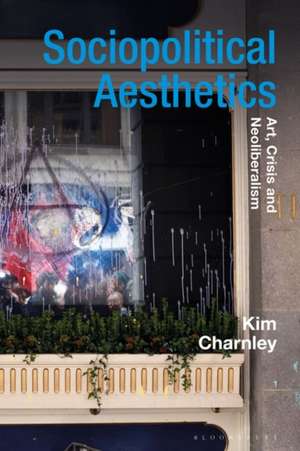Sociopolitical Aesthetics: Art, Crisis and Neoliberalism: Radical Aesthetics-Radical Art
Autor Kim Charnleyen Limba Engleză Paperback – 10 feb 2021
| Toate formatele și edițiile | Preț | Express |
|---|---|---|
| Paperback (1) | 159.53 lei 3-5 săpt. | +27.82 lei 6-12 zile |
| Bloomsbury Publishing – 10 feb 2021 | 159.53 lei 3-5 săpt. | +27.82 lei 6-12 zile |
| Hardback (1) | 374.14 lei 3-5 săpt. | +25.35 lei 6-12 zile |
| Bloomsbury Publishing – 10 feb 2021 | 374.14 lei 3-5 săpt. | +25.35 lei 6-12 zile |
Preț: 159.53 lei
Preț vechi: 173.36 lei
-8% Nou
Puncte Express: 239
Preț estimativ în valută:
30.53€ • 32.64$ • 25.45£
30.53€ • 32.64$ • 25.45£
Carte disponibilă
Livrare economică 27 martie-10 aprilie
Livrare express 12-18 martie pentru 37.81 lei
Preluare comenzi: 021 569.72.76
Specificații
ISBN-13: 9781350008731
ISBN-10: 1350008737
Pagini: 272
Ilustrații: 15 b/w illus
Dimensiuni: 138 x 216 x 19 mm
Greutate: 0.34 kg
Editura: Bloomsbury Publishing
Colecția Bloomsbury Academic
Seria Radical Aesthetics-Radical Art
Locul publicării:London, United Kingdom
ISBN-10: 1350008737
Pagini: 272
Ilustrații: 15 b/w illus
Dimensiuni: 138 x 216 x 19 mm
Greutate: 0.34 kg
Editura: Bloomsbury Publishing
Colecția Bloomsbury Academic
Seria Radical Aesthetics-Radical Art
Locul publicării:London, United Kingdom
Caracteristici
Brings together key practitioners and theorists in the field - including Gregory Sholette, John Roberts, Dave Beech, Martha Rosler, Kirstin Stakemieir and Marina Vishmidt
Notă biografică
Kim Charnley is Staff Tutor in Art History at The Open University, UK.
Cuprins
Introduction: In what sense 'sociopolitical' aesthetics? 1. Collective impurities 2. Art, economics, reproductive labour 3. Kaleidoscopic Institutions 4. Materialities of the Neoliberal State 5. Art, Ignorance and the Pedagogic Turn 6. Documentary, Post-Truth and Realism 7. Crisis, Criticism and Contemporary Art Conclusion: Autonomy, Heteronomy, Solidarity? Bibliography Index
Recenzii
Sociopolitical Aesthetics is without doubt the best political analysis of art's 'social turn', which it revisits through a reexamination of the contested meanings of collectivity and a re-reading of debates on aesthetics and politics within the context of neoliberalism, the globalisation of contemporary art and narratives of crisis. Charnley combines first rate art historical scholarship with razor sharp political analysis and an insider's understanding of contemporary art to explain the rise of socially engaged art against the prevailing wisdom that art as an institution must neutralise dissent, through co-optation, absorption, incorporation, and recuperate and by turning politics into aesthetics. What if, Charnley asks, the art system has reached the limit of its ability to contain the critical practices that occupy it.









